Meyer Burger Bundle
Can Meyer Burger Revolutionize Solar Energy Production?
Meyer Burger Technology AG is undergoing a remarkable transformation, evolving from an equipment supplier to a leading manufacturer of high-performance solar cells and modules. This strategic pivot leverages its proprietary heterojunction (HJT) and SmartWire Connection Technology (SWCT) for direct product manufacturing. Founded in Switzerland in 1953, Meyer Burger is now a key player in the European solar manufacturing landscape.
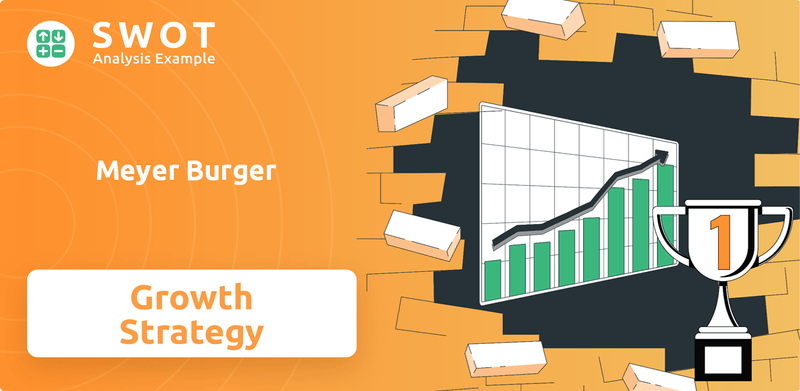
This shift positions Meyer Burger to capitalize on the growing Meyer Burger SWOT Analysis in the renewable energy market. Their ambitious expansion plans and focus on vertically integrated production aim to offer premium 'Made in Europe' solar products. Understanding Meyer Burger's growth strategy and future prospects is crucial for anyone invested in the photovoltaic technology sector, as the company navigates the challenges and opportunities within the solar industry.
How Is Meyer Burger Expanding Its Reach?
The expansion initiatives of the company are primarily focused on increasing its manufacturing capacity for high-performance solar cells and modules. This strategy is centered in Europe, particularly Germany, and the U.S. The goal is to meet the growing demand for sustainable energy solutions and to reduce reliance on Asian supply chains. These efforts are crucial for the company's growth strategy and future prospects in the competitive renewable energy market.
A key aspect of this expansion involves the completion of its solar module plant in Goodyear, Arizona. This facility is expected to reach an annual capacity of 1.4 GW. The company is also exploring opportunities to expand its cell production capacity, with mid-term and long-term targets of 3 GW and 5 GW, respectively. These expansions are designed to capitalize on the increasing adoption of photovoltaic technology and the global shift towards renewable energy.
The company is pursuing a multi-pronged approach to achieve its expansion goals. This includes optimizing existing facilities, developing new production lines, and securing strategic partnerships. The company is actively engaging with the U.S. government to secure tax credits and other incentives under the Inflation Reduction Act (IRA) to support its U.S. expansion. For a deeper understanding of the company's origins, consider reading Brief History of Meyer Burger.
The company is significantly increasing its module production capacity. The target is to reach 1.4 GW of module production capacity by the end of 2024. This expansion is critical for meeting the growing demand for solar panels and enhancing its market share.
Expansion efforts are concentrated in Europe and the United States. Key locations include Germany and the solar module plant in Goodyear, Arizona. This strategic placement aims to reduce reliance on Asian supply chains and capitalize on regional demand.
The company plans to expand its cell production capacity. Mid-term goals include reaching 3 GW, with long-term targets set at 5 GW. This expansion is essential for supporting the increased module production and meeting future market demands.
The company is actively seeking partnerships and government incentives. It is engaging with the U.S. government to secure tax credits under the Inflation Reduction Act. These efforts are crucial for supporting its expansion plans and improving its financial performance analysis.
The company's expansion strategy involves several key initiatives. These initiatives are designed to enhance its competitive advantages in the solar panel manufacturing sector and drive long-term growth.
- Optimizing existing facilities and developing new production lines.
- Securing strategic partnerships to enhance its supply chain strategy.
- Leveraging government incentives, such as those under the IRA, to reduce costs.
- Focusing on increasing solar panel efficiency to meet market demands.
Meyer Burger SWOT Analysis
- Complete SWOT Breakdown
- Fully Customizable
- Editable in Excel & Word
- Professional Formatting
- Investor-Ready Format
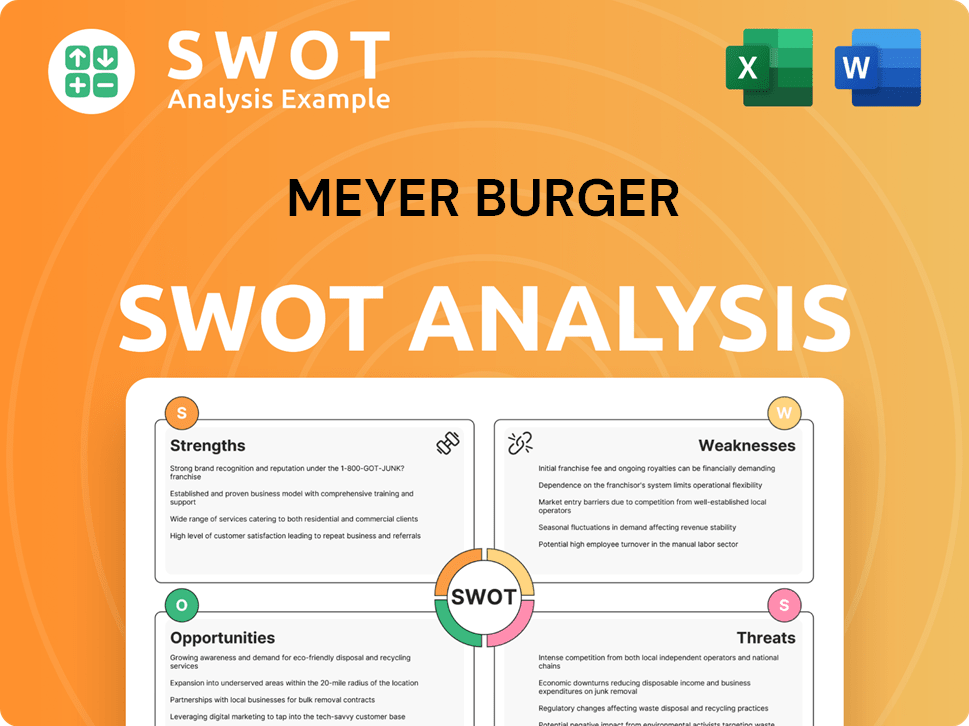
How Does Meyer Burger Invest in Innovation?
The growth trajectory of the company is significantly shaped by its innovation and technology strategy. This strategy is deeply rooted in its proprietary heterojunction (HJT) and SmartWire Connection Technology (SWCT), which are central to its competitive advantage in the solar panel manufacturing sector.
The company's commitment to research and development is unwavering, with a focus on continuously enhancing the efficiency, durability, and cost-effectiveness of its solar cells and modules. This dedication to technological advancement is a key driver of its Meyer Burger future prospects.
The company's approach to innovation extends to digital transformation and automation within its manufacturing processes, aiming to optimize production efficiency and reduce operational costs. This focus on innovation is crucial for navigating the renewable energy market.
The company consistently invests in R&D to improve solar cell and module performance. This includes enhancing efficiency, durability, and cost-effectiveness, vital for maintaining a competitive edge in the photovoltaic technology market.
The company has achieved module efficiencies exceeding 23.5%, showcasing its leadership in high-performance solar technology. This high efficiency is a key factor in its Meyer Burger growth strategy.
The company is focused on digital transformation and automation within its manufacturing processes. This approach aims to optimize production efficiency and reduce operational costs, which is crucial for long-term sustainability.
The company has secured various patents to protect its unique manufacturing processes and product designs. This intellectual property is a critical asset in the competitive solar market.
The company's commitment to sustainability drives its innovation, with a focus on environmentally friendly production methods and materials. This approach aligns with the growing demand for green energy solutions.
Continuous improvement of HJT and SWCT is expected to significantly contribute to the company's growth objectives. This focus on technology ensures the delivery of superior products that command a premium in the market.
The company's innovation strategy is further supported by its commitment to sustainability, focusing on environmentally friendly production methods and materials. Continuous improvements in HJT and SWCT are expected to significantly contribute to its growth objectives by offering superior products. For a deeper dive into the market dynamics, consider exploring the Target Market of Meyer Burger.
The company's technological advancements are pivotal for its Meyer Burger company success. These advancements include high-efficiency modules, digital transformation, and patent protection.
- High-Efficiency Modules: Achieving module efficiencies of over 23.5%.
- Digital Transformation: Implementing automation to optimize production.
- Patent Protection: Securing patents for unique manufacturing processes.
- Sustainability Initiatives: Focusing on environmentally friendly production.
Meyer Burger PESTLE Analysis
- Covers All 6 PESTLE Categories
- No Research Needed – Save Hours of Work
- Built by Experts, Trusted by Consultants
- Instant Download, Ready to Use
- 100% Editable, Fully Customizable
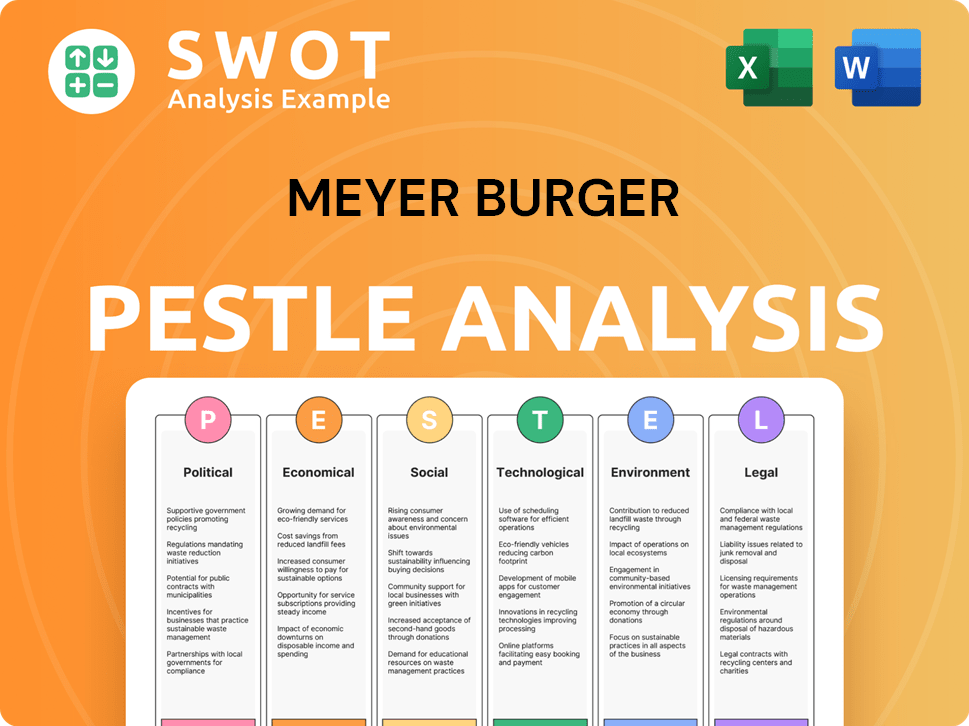
What Is Meyer Burger’s Growth Forecast?
The financial outlook for Meyer Burger is heavily influenced by its strategic moves in the solar panel manufacturing sector. The company is significantly investing in expanding its production capacity, particularly within the United States. This expansion is a key element of its Meyer Burger growth strategy, aiming to capitalize on the growing demand for solar panels.
A major factor affecting Meyer Burger's financial performance is the shift towards profitable module manufacturing, especially in the U.S. market. This strategic focus is designed to improve financial results and take advantage of favorable market conditions. The company's ability to secure funding and manage costs will be critical for achieving its financial goals.
For the 2023 financial year, Meyer Burger reported a net loss of CHF 291.9 million. This loss was primarily due to tough market conditions in Europe and the substantial investments made in its U.S. expansion. However, the company anticipates a positive impact from the Inflation Reduction Act (IRA) in the U.S., which offers significant tax credits for solar manufacturing. This financial support is expected to boost Meyer Burger's profitability in the coming years.
Meyer Burger expects to generate substantial revenue from its U.S. module production. The company is targeting a significant increase in sales as its U.S. operations reach full capacity. This revenue growth is crucial for the company's long-term financial health and market position.
The company projects an EBITDA contribution of approximately CHF 250 million from its U.S. operations once full capacity is achieved. This positive financial outlook is a key indicator of the success of Meyer Burger's expansion strategy. The anticipated EBITDA growth highlights the potential for strong financial performance in the U.S. market.
Meyer Burger has secured a financing package of up to CHF 150 million from the German government. This financial support is important for funding the company's growth initiatives. The company is also actively exploring additional financing options, including potential equity raises, to support its expansion plans.
While the European market presents near-term challenges, the long-term financial strategy focuses on the successful ramp-up of U.S. production. The company is working to overcome these challenges through strategic investments and operational improvements. This strategic focus is essential for achieving sustainable profitability.
Meyer Burger aims to realize cost efficiencies through advanced manufacturing technologies. The company is investing in innovative manufacturing processes to reduce production costs and improve profitability. These technological advancements are crucial for maintaining a competitive edge in the renewable energy market.
- Focus on advanced manufacturing technologies to improve efficiency.
- Strategic investments in U.S. production to capitalize on IRA benefits.
- Active pursuit of financing to support growth and expansion.
- Addressing challenges in the European market.
For more insights into the company's financial structure and ownership, consider exploring the details about Owners & Shareholders of Meyer Burger.
Meyer Burger Business Model Canvas
- Complete 9-Block Business Model Canvas
- Effortlessly Communicate Your Business Strategy
- Investor-Ready BMC Format
- 100% Editable and Customizable
- Clear and Structured Layout
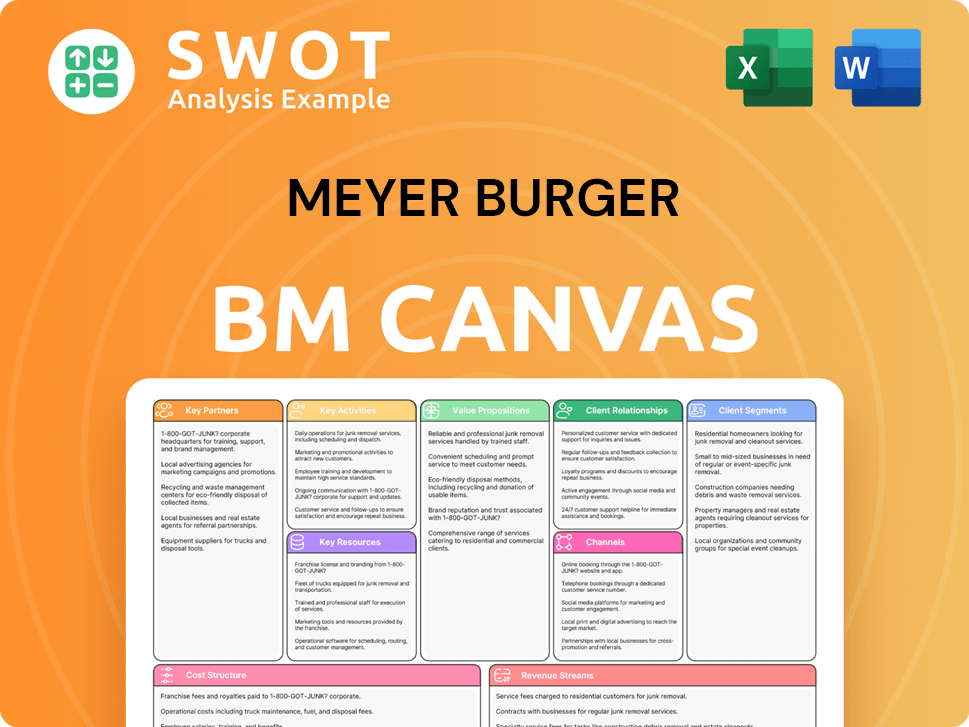
What Risks Could Slow Meyer Burger’s Growth?
The path forward for the Meyer Burger company is not without its challenges. The company faces various risks that could impact its ambitious growth plans within the solar panel manufacturing sector. These include competitive pressures, regulatory uncertainties, and operational hurdles.
A key risk stems from intense competition, especially from low-cost manufacturers in Asia. This can squeeze profit margins and affect Meyer Burger's market share. Furthermore, the company's expansion strategy is subject to regulatory changes, which can introduce unpredictability. Supply chain disruptions and the successful ramp-up of its U.S. production facilities also pose significant risks.
Securing sufficient and timely financing remains crucial for Meyer Burger's expansion. The company's ability to mitigate these risks through strategic diversification, technological innovation, and proactive engagement with policymakers will be key to its success. The decision to halt module production in Freiberg, Germany, highlights its flexibility in adapting to market dynamics.
The renewable energy market is highly competitive, with numerous players vying for market share. This can lead to price wars and reduced profitability. The presence of established manufacturers and new entrants adds to the competitive landscape, pressuring Meyer Burger's margins.
Changes in government regulations and trade policies can significantly impact the solar industry. While incentives like the IRA in the U.S. offer opportunities, they also introduce complexities. Political instability and policy shifts can create uncertainty for Meyer Burger's operations.
Disruptions in the supply chain can affect production timelines and increase costs. Reliance on specific suppliers for critical raw materials or components poses a risk. Geopolitical events and logistical challenges can exacerbate these vulnerabilities, impacting Meyer Burger's manufacturing capacity.
The successful ramp-up of new production facilities is crucial for achieving Meyer Burger's future prospects. Any delays, technical issues, or cost overruns in its U.S. operations could significantly impact its financial performance and ability to meet market demand. These issues can impact Meyer Burger's stock price forecast.
Securing adequate and timely financing is essential for funding its ambitious expansion plans. The company's ability to raise capital at favorable terms can be influenced by market conditions and investor sentiment. This directly affects Meyer Burger's investment potential.
Operational challenges, such as managing production efficiency and quality control, can affect Meyer Burger's performance. The company needs to maintain high standards to compete effectively. This includes the need for continuous improvements in solar panel efficiency.
To mitigate these risks, Meyer Burger is focusing on several key strategies. These include diversifying its manufacturing footprint to reduce reliance on any single location, actively engaging with policymakers to advocate for supportive industrial policies, and continuously investing in technological differentiation to maintain a competitive edge. For example, in early 2024, the company announced plans to expand its manufacturing capacity in the U.S., demonstrating its commitment to the market. Furthermore, understanding the Competitors Landscape of Meyer Burger is crucial for developing effective strategies.
Diversifying its manufacturing locations helps Meyer Burger reduce its exposure to regional risks. This strategy can include establishing facilities in different countries or regions. This approach also supports its sustainability initiatives by ensuring a more resilient supply chain.
Investing in cutting-edge photovoltaic technology is crucial for maintaining a competitive advantage. This involves research and development to improve solar panel efficiency and reduce production costs. This approach directly impacts Meyer Burger's technology roadmap.
Actively engaging with policymakers to advocate for favorable industrial policies is essential. This includes lobbying for incentives and regulations that support the solar industry. This can influence Meyer Burger's market share and long-term vision.
Developing a robust supply chain strategy is key to mitigating supply chain risks. This includes diversifying suppliers and establishing long-term contracts. This also includes strategies to manage costs and ensure timely delivery. This is important for Meyer Burger's challenges and opportunities.
Meyer Burger Porter's Five Forces Analysis
- Covers All 5 Competitive Forces in Detail
- Structured for Consultants, Students, and Founders
- 100% Editable in Microsoft Word & Excel
- Instant Digital Download – Use Immediately
- Compatible with Mac & PC – Fully Unlocked
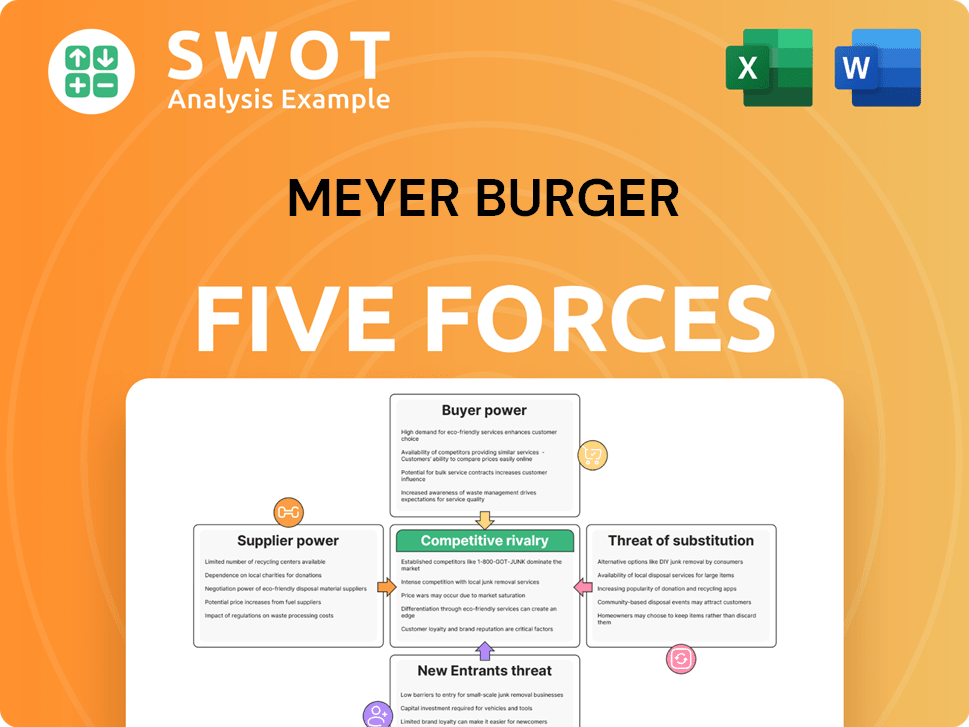
Related Blogs
- What are Mission Vision & Core Values of Meyer Burger Company?
- What is Competitive Landscape of Meyer Burger Company?
- How Does Meyer Burger Company Work?
- What is Sales and Marketing Strategy of Meyer Burger Company?
- What is Brief History of Meyer Burger Company?
- Who Owns Meyer Burger Company?
- What is Customer Demographics and Target Market of Meyer Burger Company?
Disclaimer
All information, articles, and product details provided on this website are for general informational and educational purposes only. We do not claim any ownership over, nor do we intend to infringe upon, any trademarks, copyrights, logos, brand names, or other intellectual property mentioned or depicted on this site. Such intellectual property remains the property of its respective owners, and any references here are made solely for identification or informational purposes, without implying any affiliation, endorsement, or partnership.
We make no representations or warranties, express or implied, regarding the accuracy, completeness, or suitability of any content or products presented. Nothing on this website should be construed as legal, tax, investment, financial, medical, or other professional advice. In addition, no part of this site—including articles or product references—constitutes a solicitation, recommendation, endorsement, advertisement, or offer to buy or sell any securities, franchises, or other financial instruments, particularly in jurisdictions where such activity would be unlawful.
All content is of a general nature and may not address the specific circumstances of any individual or entity. It is not a substitute for professional advice or services. Any actions you take based on the information provided here are strictly at your own risk. You accept full responsibility for any decisions or outcomes arising from your use of this website and agree to release us from any liability in connection with your use of, or reliance upon, the content or products found herein.